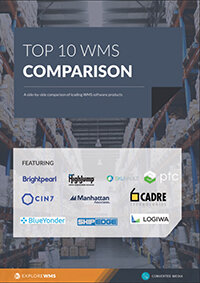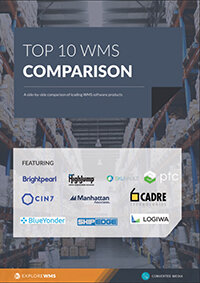WMS SQL vs Oracle database: an objective comparison
Warehouse management systems, known as WMS, all are designed in different ways to help a business store items in a warehouse in an optimum way and move them to where they are needed very efficiently. Behind the screens and reports that we see are database systems. Oracle SQL and Microsoft SQL are two of the leading engines that make our WMS run.
What is SQL
SQL stands for structured query language. It is a programming language designed to manage data using the relationships between various data elements. A query can be very simple, such as “How many widgets do we have on the shelf now”? Every transaction and report we use in our WMS system is based on queries and usually many of them in a string. The result for us is the next part number and bin location our picker should move to and the quantity they should select for picking.
The original development of SQL was by IBM in the 1970’s. In the late 1970s, Relational Software, Inc. saw the potential of the concepts described by IBM and developed their own SQL-based RDBMS. In June 1979, Relational Software introduced the first commercially available implementation of SQL. Relational Software evolved and now is Oracle.
Microsoft released their version in 1989.
Oracle’s dialect
The specific language Oracle uses is PL/SQL or procedural language SQL. PL/SQL handles variables, stored procedures and built-in functions a little differently than T-SQL oracle can handle up to hundreds of thousands of simultaneous users. Oracle SQL statements allow data to be controlled from a central tabular repository. A database administrator is responsible to create users, assign privileges, add records, delete redundant information, modify existing data, and process queries. This centrally stored data is shared and accessed by various applications. This eliminates data entry and data storage redundancy.
Oracle syntax is more complex than Microsoft but can be more efficient when used by skilled developers.
Microsoft’s flavor
Microsoft’s SQL Server uses T-SQL or transact SQL. Many consider SQL Server to be easy to work with and it integrates well with other Microsoft products like the Office suite. SQL server originally only worked with Microsoft Windows and now also works in Linux too. SQL Server licenses are significantly less expensive than Oracle SQL.
Microsoft provides a huge amount of support at no additional cost. The support includes technical notes, bug descriptions, scripts, patches, and downloads.
Which one is better?
Both Oracle and SQL Server are mature, excellent choices for relational database management. Neither one is preferable over the other. The answer depends on the particular situation, Both are powerful. Most users will never know and never care which SQL is in their WMS. Analysts who write queries might recognize the slightly different syntax but will easily learn those that apply to their work. Many applications include scripts provided by the WMS developer which means the analyst does not need to learn the actual SQL query.
WMS providers have target businesses they define as desired customers and will select Oracle or Microsoft SQL based on their expertise providing the best tools for their customers. If Jasci works for our business, we know Manhattan works as well for another business.
Keep in mind that these are not the only query languages used by WMS systems. PostgreSQL is an open-source language originally developed at the University of California in Berkeley in 1996. There are WMS systems that use this language too.
WMS at work
Let’s look at a WMS transaction. A truck and trailer arrives at the gate. We want our WMS to direct the truck to a particular door and the needed crew and equipment to unload that truck on hand and ready to work. We want a specific bin already selected so we can direct the items in that trailer toward that stock location. We want that slot chosen based on demand for that item in the near future and the location of any existing inventory.
Any of us will have our own definition of the logic required. The developer’s logic will be similar to ours. Our system configuration settings will affect the logic but those are our way to implement rules governing each transaction. There is no 100% always correct answer to where that stock item should be slotted.
Over time, we can analyze our business and determine if the put away locations determined by our WMS were reasonably accurate and if they made our warehouse run beneficially. I suspect no matter which WMS our business uses, the answer is our WMS does a good job.
The developer’s logic will depend partly on their experience and training. The SQL version used will be a factor as well as Oracle might bend the transaction one way and SQL Server another direction. At the end, if our business benefits, the particular SQL makes little difference in the utility of the WMS we use.
Your WMS provides you with real-time inventory visibility. Your transactions are posted efficiently and effectively so your inventory is always accurate. Your picking personnel work well together, items are nearly always ready for packing and on-time shipping. Their morale is good. They work hard yet are able to develop their skills too.
You analyze inventory levels and transactions and find ways to improve your service frequently and your customers are satisfied now and you know in the future that satisfaction will increase. When a customer requests a change, you can modify your processes and your WMS modifications to implement that change are easily managed.
Conclusion
Developers of WMS and other enterprise-level database systems must choose the SQL tool that is best for them. Your IT staff must know and understand how to manage your WMS which means they too must have good competence in the SQL used by your WMS. the rest of us only need to be confident the SQL we are blindly using works for us.
Free white paper

Top 10 WMS comparison
Compare the best WMS systems on the market

Related articles
-

How to test your WMS data before go-live
Four ways to test your WMS data prior to your final go-live
-

Mission-critical features of food lot traceability software
What features of food traceability software will help you during a food recall
-

Four WMS security concerns for pharmaceutical warehouses
WMS security concerns pharmaceutical warehouses should look out for, and how to avoid them

